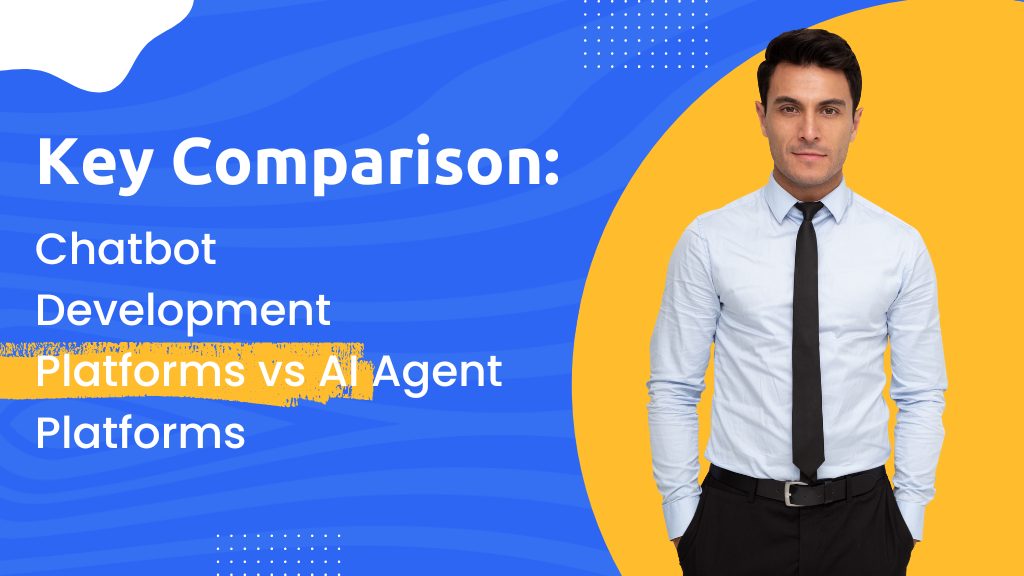In today’s digital landscape, businesses are increasingly turning to automation to enhance customer engagement and streamline operations. Two prominent technologies leading this transformation are chatbot development platforms and AI agent platforms. While both aim to automate interactions, they differ significantly in capabilities, applications, and outcomes. This comprehensive guide delves into these differences, providing insights into top platforms in each category, and offering guidance on selecting the right solution for your business needs.
Understanding Chatbot Development Platforms
Chatbot development platforms are tools designed to create conversational agents that interact with users through text-based interfaces. These platforms often offer drag-and-drop builders, pre-built templates, and integrations with various messaging channels, enabling businesses to deploy chatbots for customer support, lead generation, and more.
Top Chatbot Development Platforms
1. Botsify
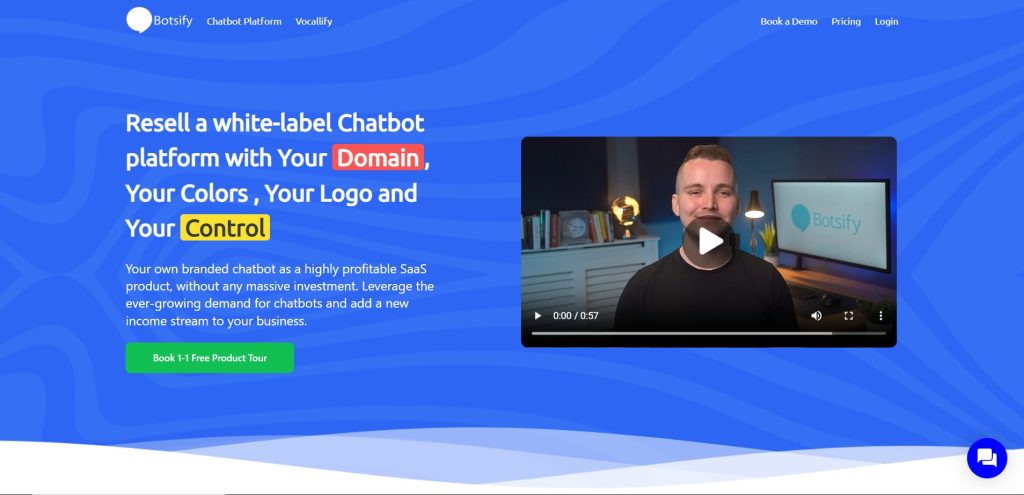
Overview: Botsify is a versatile chatbot development platform that allows businesses to create AI-powered chatbots without coding. It supports multiple channels, including websites, Facebook Messenger, and WhatsApp chatbot, making it suitable for diverse customer engagement strategies.
Pros:
- User-friendly interface with drag-and-drop builder
- Supports multiple messaging platforms
- Offers AI and machine learning capabilities
- Provides analytics and reporting tools
- 24/7 customer support
Cons:
- Limited customization for advanced users
- Some features require higher-tier plans
- Integration options can be expanded
- Learning curve for complex workflows
Best Suited For:
- Small to medium-sized businesses
- E-commerce platforms
- Customer service automation
Pricing: Plans start at $49/month, with custom pricing for enterprise solutions.
2. Tidio
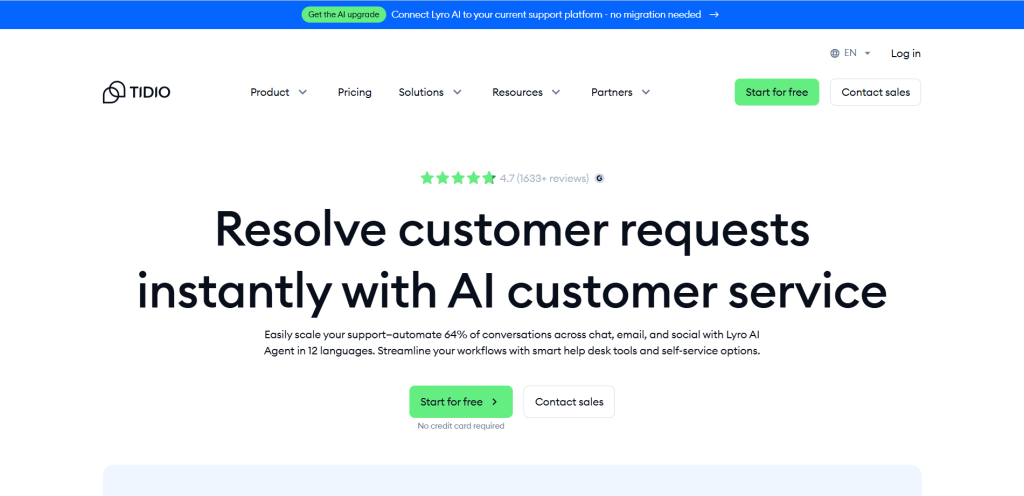
Overview: Tidio combines live chat and chatbot functionalities, providing a unified platform for customer communication. It integrates with various CMS and e-commerce platforms, enhancing customer service and sales processes.
Pros:
- Easy integration with popular platforms like Shopify and WordPress
- Real-time visitor monitoring
- Customizable chatbot templates
- Mobile app for on-the-go management
- Multilingual support
Cons:
- Limited advanced AI capabilities
- Free plan has restricted features
- Some integrations require technical knowledge
- Occasional delays in customer suppor
Best Suited For:
- E-commerce businesses
- Startups
- Customer support teams
Pricing: Free plan available; paid plans start at $19/month.
3. Bitcot
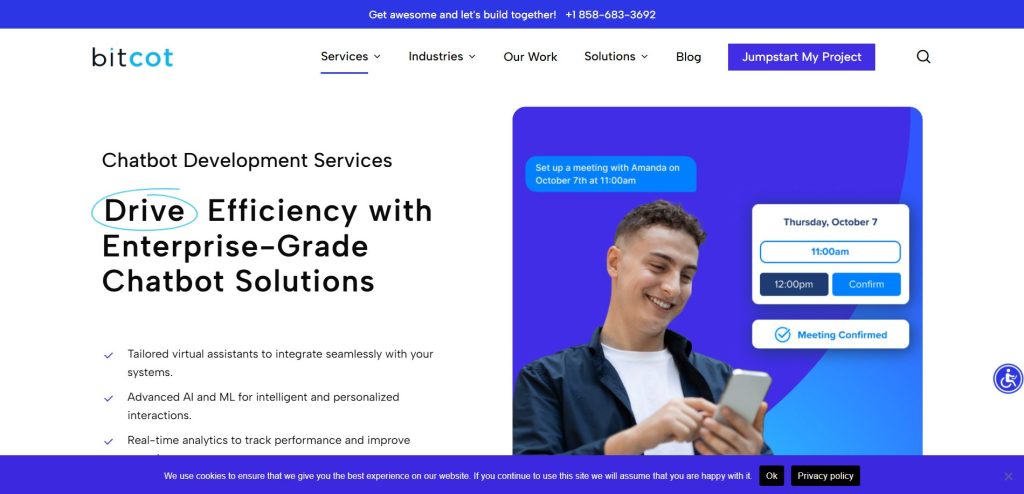
Overview: Bitcot offers custom chatbot development services, focusing on creating tailored solutions for businesses. Their expertise spans various industries, delivering chatbots that align with specific business goals.
Pros:
- Customized chatbot solutions
- Expertise in multiple industries
- Integration with existing systems
- Focus on user experience design
- Dedicated development team
Cons:
- Longer development timelines
- Higher cost compared to DIY platforms
- Limited self-service options
- Requires clear project scope
Best Suited For:
- Enterprises
- Businesses with specific requirements
- Long-term projects
Pricing: Custom pricing based on project scope.
Generate More Leads With Website & Messenger Chatbots
Gather quality leads on autopilot and 10x your ROI with automated chats
4.WotNot
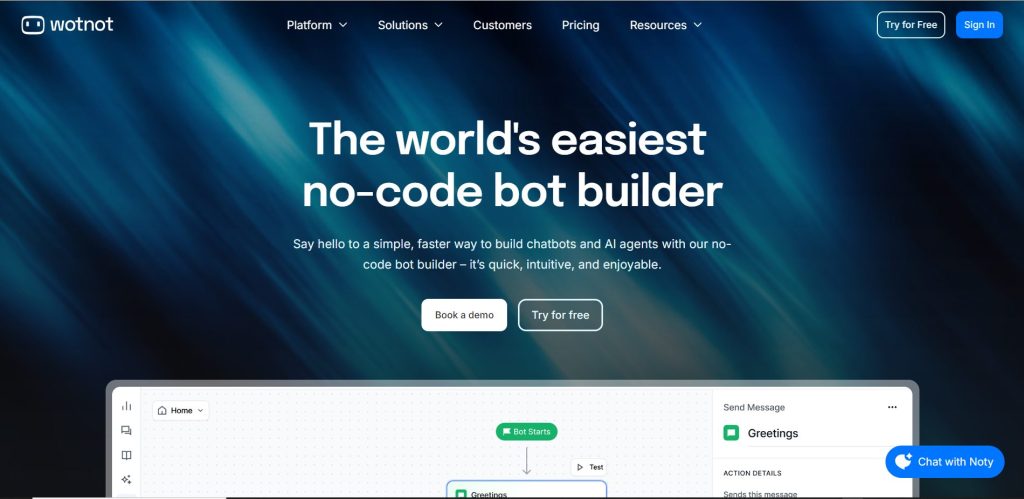
Overview: WotNot is a no-code chatbot platform that enables businesses to create conversational agents for various use cases. It offers a visual builder, analytics, and integration capabilities to streamline customer interactions.
Pros:
- No-code visual builder
- Pre-built templates for quick deployment
- Omnichannel support
- Real-time analytics
- Seamless CRM integrations
Cons:
- Limited advanced AI functionalities
- Customization options can be restricted
- Higher-tier plans needed for premium features
- Learning curve for complex workflows
Best Suited For:
- Marketing teams
- Customer support departments
- Businesses seeking quick deployment
Pricing: Plans start at $49/month.
5. Imperson
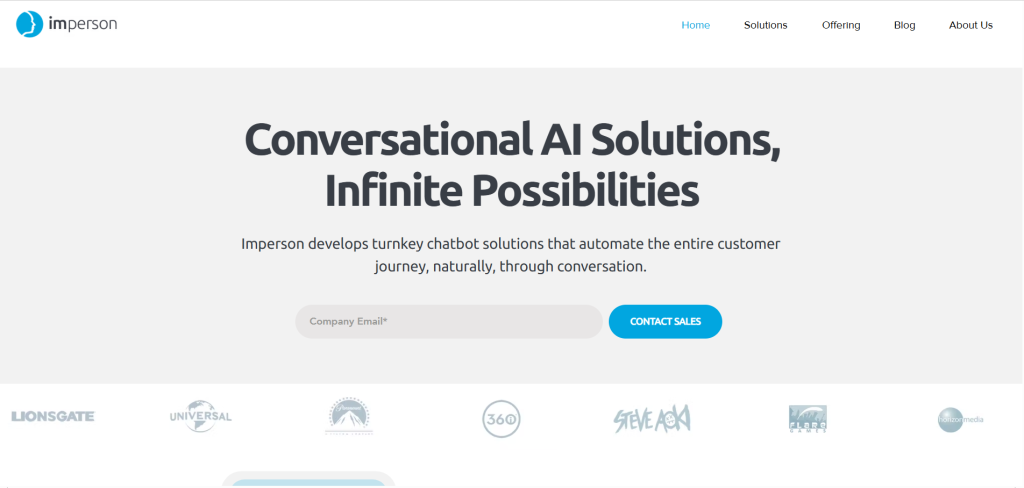
Overview: Imperson specializes in creating conversational chatbots that simulate human-like interactions. Their focus is on delivering engaging experiences across various platforms, including website chatbot and messaging apps.
Pros:
- Human-like conversational experiences
- Cross-platform deployment
- Focus on user engagement
- Customizable chatbot personas
- Analytics for performance tracking
Cons:
- Limited self-service options
- Higher cost for custom solutions
- Longer development cycles
- Requires ongoing maintenance
Best Suited For:
- Brands focusing on user engagement
- Entertainment industry
- Marketing campaigns
Pricing: Custom pricing based on project requirements.
Why Should You Hire Chatbot Development Platforms to Build Chatbots for Your Business?
Engaging a professional chatbot development platform offers several advantages:
- Expertise and Experience: These platforms bring specialized knowledge and experience, ensuring the chatbot aligns with your business objectives and industry standards.
- Customization: They provide tailored solutions that cater to your specific needs, enhancing user experience and operational efficiency.
- Integration Capabilities: Professional platforms ensure seamless integration with your existing systems, such as CRM and ERP, facilitating smooth operations.
- Scalability: They build scalable solutions that grow with your business, accommodating increasing user interactions without compromising performance.
- Support and Maintenance: Ongoing support and maintenance services ensure your chatbot remains up-to-date and functions optimally.
Exploring AI Agent Platforms
AI agent platforms extend beyond text-based interactions, incorporating voice capabilities and advanced AI to facilitate more natural and dynamic conversations. These platforms are particularly beneficial for businesses aiming to enhance customer service through voice interactions.
Top AI Agent Platforms
1. Vocallify
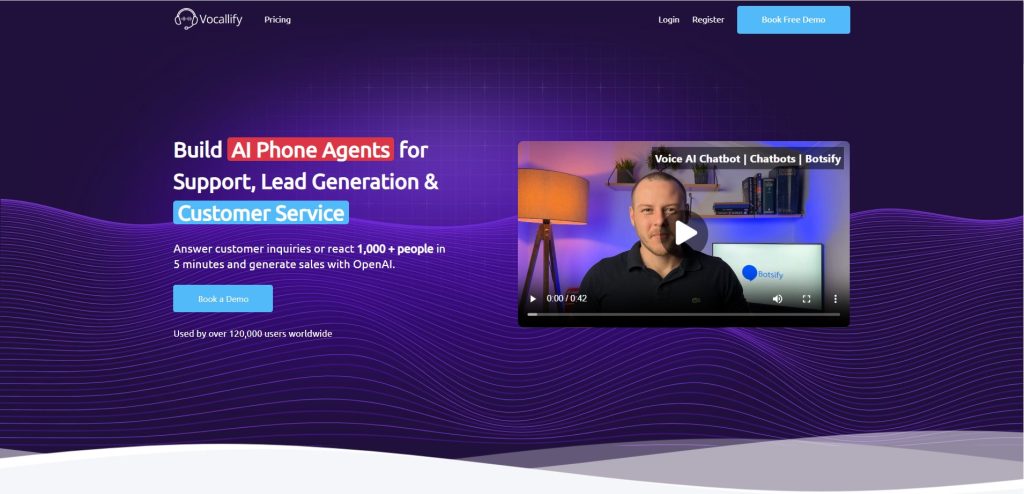
Overview: Vocallify offers AI voice agents that enable businesses to automate customer interactions over phone calls. It provides customizable voice options and supports multiple languages, enhancing global customer engagement.
Pros:
- Supports over 30 English accents and 130+ languages
- Customizable voice agents
- Real-time transcription and analytics
- Integration with existing systems
- Scalable solutions for various industries
Cons:
- Requires initial setup and training
- Higher cost for advanced features
- Dependent on internet connectivity
- Limited self-service options
Best Suited For:
- Customer support centers
- Sales and lead generation teams
- Businesses with global clientele
Pricing: Custom pricing based on usage and features.
2. Capacity
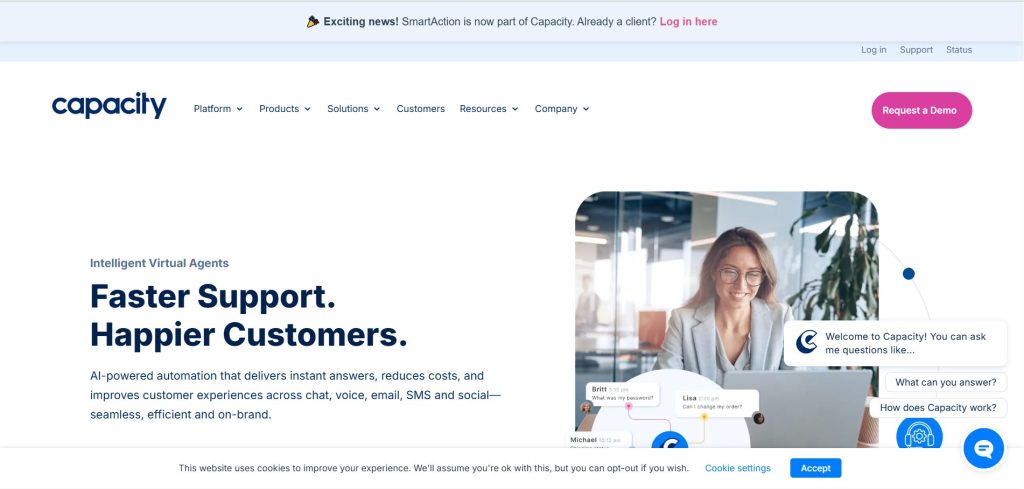
Overview: Capacity provides AI-powered virtual agents that handle complex customer interactions using natural language understanding. With features like 24/7 availability and integration with traditional IVR systems, Capacity helps reduce costs while improving the quality of service
Pros:
- Advanced natural language understanding
- 24/7 customer support
- Integration with existing IVR systems
- Scalable for various industries
- Reduces operational costs
Cons:
- Implementation may require technical expertise
- Higher initial investment
- Limited customization without professional services
- Ongoing maintenance required
Best Suited For:
- Large enterprises
- Industries with complex customer service needs
- Businesses seeking to enhance IVR systems
Pricing: Custom pricing based on project scope.
3. Tabbly
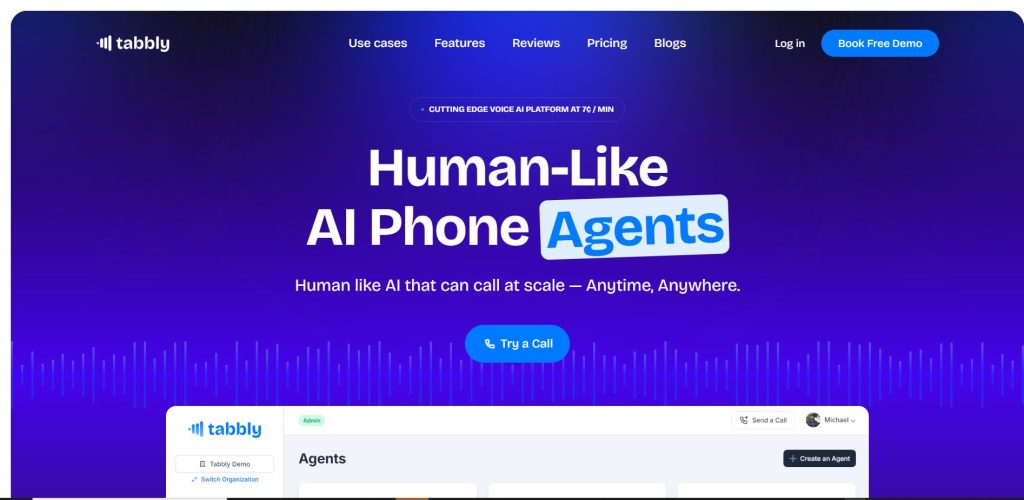
Tabbly is a conversational AI platform focused on voice automation, designed for sales and support teams. It combines voice AI agents with CRM capabilities to provide a seamless, real-time interaction layer for businesses doing outbound and inbound call management.
Pros:
-
Built specifically for outbound sales calls
-
Native CRM and lead tracking integration
-
Offers robust AI learning through call behavior insights
-
Easy-to-use campaign builder for voice AI automation
-
Detailed analytics dashboard for performance reviews
Cons:
-
Limited multilingual support
-
Mostly focused on voice (less on omnichannel)
-
Not ideal for highly regulated industries due to data compliance limitations
-
Requires some technical experience to implement advanced workflows
Best suited for:
-
Outbound sales teams
-
Telemarketing firms
-
Call centers focusing on lead generation
Pricing:
Starts at $89/month per user. Custom plans available for enterprise use.
Conclusion
In 2025, businesses are increasingly turning to AI-driven automation to improve customer experience, cut costs, and operate efficiently at scale. Whether you’re considering a chatbot development platform or exploring AI agent platforms, the right choice depends on your business goals, audience, and the complexity of interactions you aim to automate.
-
Chatbot platforms like Botsify, Tidio, WotNot, Imperson or Bitcot offer robust, scalable solutions for multichannel automation across websites, social media, and messaging apps.
-
Voice AI agent platforms like Vocallify, Tabbly, and Capacity focus on simulating natural, human-like conversations on phone calls—perfect for sales calls, appointment scheduling, and customer support.
If your goal is omnichannel support with chat-based experiences, a chatbot development platform is your best bet. But if voice-based automation and cold calling are key to your growth strategy, an AI voice agent platform will give you the edge.
At the intersection of both lies the opportunity to create seamless, integrated experiences—automating conversations wherever your customers are. Platforms like Botsify and Vocallify offer businesses the best of both worlds.
Are You Ready To SkyRocket Your Business With Our AI Voice Agents
Click The Button Below And Gather Quality Leads With Vocallify

